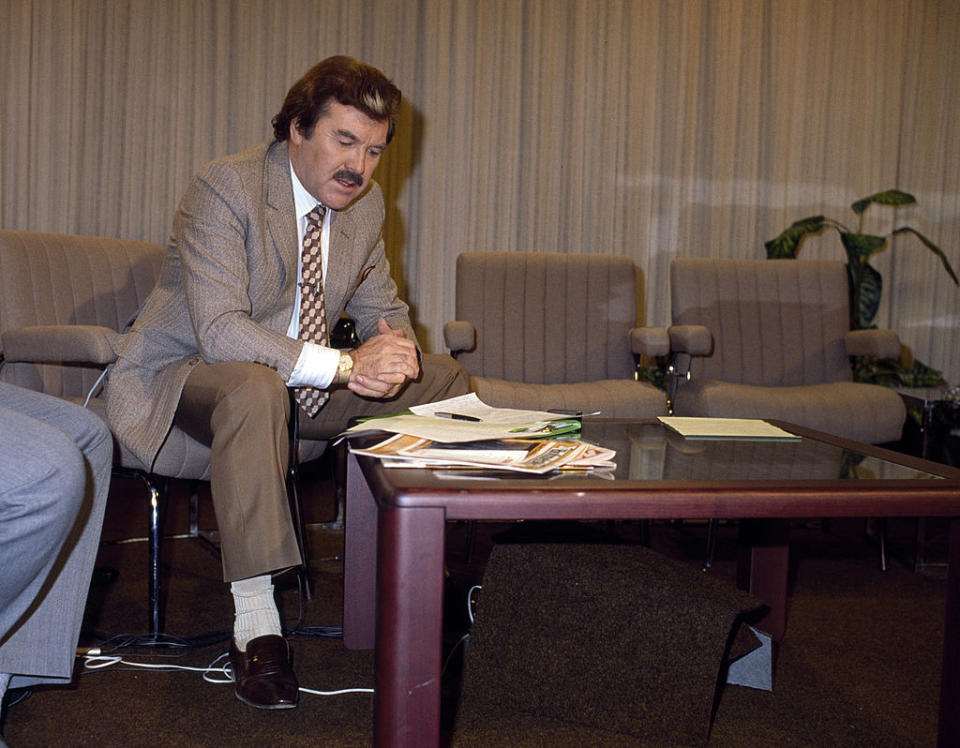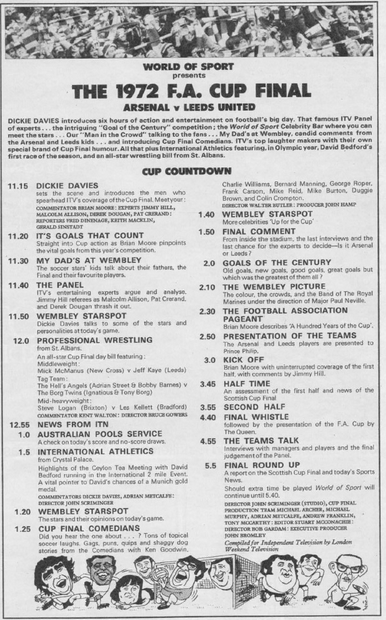yahoonick
In our weekly series, Yahoo Sport’s Nick Metcalfe features a famous voice of sport. World of Sport presenter Dickie Davies is the latest to go under the spotlight.

Strictly speaking, Dickie Davies could also go down as a “face of sport”. The face and voice were very much in tandem. And what a delightful companion he was for millions for viewers every Saturday afternoon for a generation.
Davies did many other notable things in his broadcasting career, but nothing in the public’s mind will compare to him fronting ITV’s World of Sport.
The programme is part of television folklore. On the Ball. The ITV Seven. Wrestling with Kent Walton. And for 17 years, the same peerless presenter holding it all together.
Come rain or shine, from lunchtime to teatime, we knew where we were when we tuned into ITV on a Saturday afternoon. We were with Davies. And it felt just right.
Davies started in broadcasting as an announcer for Southern Television. He moved to World of Sport in 1963 as understudy to the legendary Eamonn Andrews. The programme first went on air in January 1965. It was originally called Wide World of Sports (like the famous ABC programme in America), but there wasn’t much wide about it in the early days.
The line-up for the first programme was swimming from Porthcawl lido, wrestling in Newport, racing at Catterick and snooker from the National Liberal Club in London. It wasn’t long before Wide World of Sports became World of Sport.
The BBC had already established its Saturday afternoon sports programme, Grandstand. Such was the might of the corporation that nearly all the big annual events were theirs. Five Nations rugby, Wimbledon, Test cricket, The Open. Grandstand, with their own famous presenter David Coleman, had a formidable portfolio throughout the year. Coleman crowed about the new ITV rival: “We’ll have them off the air in six months.”
But the very different approach taken by World of Sport somehow worked. The programme endeared itself to millions of viewers. In 1968, Davies took over in the hot seat. It was the start of a memorable broadcasting era.
At the start of his career, Davies was known as Richard. It was footballer turned TV man Jimmy Hill that suggested he change it to Dickie, the name by which his wife had long known him. In later years, Davies reflected: “The difference it made was phenomenal.”
World of Sport had a familiar rhythm. There was the On The Ball with Brian Moore at the start of the programme, which looked forward to the football being played that afternoon.
More often than not, this was followed by highlights from home or abroad, sometimes of weird and wacky sports. There was kart racing, hang gliding and ten-pin bowling. And sometimes even more unlikely pursuits like log-rolling and cliff-diving. World of Sport just refused to play by the rules.
I think some of that is a little overplayed however. I’ve seen plenty of World of Sport line-ups that featured far more substantial and mainstream sports. There were big golf tournaments at home and abroad, as well as plenty of tennis and American football highlights, including the Super Bowl. And occasionally, the programme had rights to genuinely special events like the Tour de France and Ryder Cup (the biannual golf match was however far less competitive in those days of American domination over Britain and Ireland).
The ITV Seven certainly saw the programme on more familiar TV sports territory throughout the year, with horse racing shown from a host of courses around the country. The likes of Brough Scott and John Oaksey added some real weight to the afternoon’s proceedings.
And then came perhaps the most famous World of Sport section of all. The wrestling. It’s still fondly remembered by generations of viewers. Kent Walton was the commentator, and an unlikely cast of competitors became national celebrities. Giant Haystacks. Big Daddy. Kendo Nagasaki. How we loved watching them all.
The end of the programme featured the real bread and butter of the whole sporting afternoon, the full-time football results and classified check. At a time when there was so little TV football (there were certainly no live league matches – not until 1983 anyway) this section was pivotal.
Davies had everything you wanted in a presenter. Authority. Gravitas. Knowledge. We trusted him implicitly. We knew he knew what he was talking about. And as with all the greats, he made a very difficult job look extremely easy.
There was one big day of the sporting year where World of Sport really was the equal of Grandstand. The FA Cup final. Back then, it was a huge national event, in part because it was the only domestic club match shown live on TV. Coverage began many hours before the match, with the build-up seen as a crucial part of the whole day.
Below, you can see a perfect example of those halcyon days from 1972, and a meeting at Wembley between Arsenal and Leeds. On air at 11.15am with Davies setting the scene. The rather wonderfully titled “My Dad’s at Wembley” soon after, with “Wembley Starspot” and “Cup Final comedians” among the treats to follow. And Brian Moore and Jimmy Hill your team for the match. Now that’s a special day of TV.

The following video clip gives us a fine example of Davies at work from the summer of 1982. Firstly, that’s that wonderfully evocative theme tune. Cue Davies…
“Good Afternoon and a very warm welcome to World of Sport, and a programme that stretches over six hours ahead of us. It’s live World Cup action that extends our programme, with the Group One match between Poland and Cameroon at ten to four. Live too is our motorcyle racing and today’s ITV Six. And we also present rallying and top class athletics from the United States.”
Davies is of course smartly dressed. Suit. Tie. Sunday best for a Saturday afternoon. I love the World of Sport team on typewriters in the background too. The message was clear - this was live, and relevant.
This next clip shows Davies at the other end of the programme, during the regular football season. In many ways, this was when we really knew for sure how good he was. With results coming in at pace from around the country, it’s in these moments that the Saturday sports presenter really earns their corn.
The facts of the afternoon need to be transmitted clearly and precisely. There are details of games, scorers, tables, and in those days the all-important pools news. Davies carried it off with great panache.
I love his trailing of the following week’s programme too. The “you’re all invited next week,” and the reference to “soccer”. In the best way, Davies truly did hail from the old school.
The tag “housewives favourite” was adopted by the tabloids to refer to Davies. It was something that always bemused the man himself. Years later, he told the Independent: “I had this white streak, not dyed, absolutely genuine, and it became a kind of trait. For some strange reason, it caught on. It didn’t work for Norman Lamont, but it worked for me.“
Sadly, as the years went on, the future of the programme was called into question, with ITV bosses seemingly unsure there was room for two competing sporting programmes on a Saturday afternoon. Racing had switched to Britain’s newest TV network, Channel 4, while wrestling wasn’t proving to be the popular draw it was in its Seventies pomp.
World of Sport was taken off the air, the last edition going out in September 1985. Saint and Greavsie took over from On The Ball, while wrestling did carry on for a few years. But in truth, Saturdays were never the same.
Davies stayed for a while with ITV, presenting coverage of boxing and snooker. And he was a part of their team for the 1988 Seoul Olympics.
But he did eventually make his departure from ITV, joining Eurosport to present their snooker coverage. At the same time, he presented sports bulletins for Classic FM in the early days of the radio station.
Davis suffered a stroke in 1995. He did eventually make a good recovery, although it was some time before his speech returned to normal.
In the late 1990s he returned to our screens with Sky, presenting Dickie Davies’ Sporting Heroes and Bobby Charlton’s Football Scrapbook.
In 2005, ITV looked back at World of Sport, half a century since it was first shown and 20 years since it was taken off the air. Davies fronted a special nostalgic programme looking back at those memorable TV days.
Davies has always come across as the same through all these years. The perfect gentleman. The well-spoken voice of clarity and authority. And just a good, dependable companion. It has been such a pleasure to watch him at work.


